Operetta Land online programme
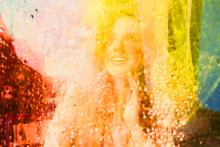
Performance information
Voorstellingsinformatie
Performance information
Duration
1 hour and 40 minutes, no interval
The performance is mainly sung in Dutch.
Dutch surtitles based on the text by Paulien Cornelisse.
English surtitles translated by Jonathan Reeder.
Makers
Concept, stage direction, set and costume design
Steef de Jong
Libretto
Paulien Cornelisse
Musical direction
Aldert Vermeulen
Co-direction
Maria Lamont
Light
Cor van den Brink
Dramaturgy
Laura Roling
Arrangements
Marijn van Prooijen
Team Groots en Meeslepend
Ina Veen, Stephan Nelissen, Willy Veen
Cast
De verzinner/Lady Kant/Venus
Steef de Jong
Koningin
Raoul Steffani
Prinses Galathea
Elenora Hu*
Minister van Financiën
Marc Pantus
Graaf Lothar
Laetitia Gerards
Koning Pygmalion/Heggenschaarhuzaar
Frederik Bergman
Sir Taki/Heggenschaarhuzaar
Femke Hulsman
Prins Nicola/Heggenschaarhuzaar
Ian Castro*
Heggenschaarhuzaren (movers)
Liah Frank, Manon Wittebol, Geert Sweep, Evelien Emmens
Heggenschaarhuzaren (stage hands)
Nico Iping, Zeth Pattinama, Isabel Voorbij, Maurice Potemans, Arjen Koch
*Dutch National Opera Studio
National Youth Orchestra of the Netherlands
Production team
Rehearsal pianists
Jan-Paul Grijpink
Luba Podgayskaya
Stage management
Joost Schoenmakers
Sanne van Loenen
Emma Eberlijn
Tessel van Ruitenbeek (intern)
Artistic affairs and planning
Sonja Heyl
Costume supervisor
Maarten van Mulken
Master carpenter
Wim Kuijper
Lighting manager
Ianthe van der Hoek
Props master
Hanna Tynkkynen
First dresser
Jenny Henger
First wigs and make-up artist
Pim van der Wielen
Sound engineer
Ramón Schoones
Operator
Michel van Veen
Orchestra representative
Ivo Lemken
Surtitle director
Eveline Karssen
Surtitle operator
Jan Hemmer
Set supervisor
Puck Rudolph
Project coordinator
Barbara Gautschi
Production manager
Nicky Cammaert
National Youth Orchestra of the Netherlands
First violin
Martine Velthuis
Niki Perdok
Skye Kinlaw
Maria Rodríguez Estévez
Anna Gruzinskaia
Reinout Pauwels
Karina Sosnowska
Hadewych de Vos
Celeste Engel
Valentine Blangé
Althea Witmer
Inana Garis
Second violin
Romina Engel
Lisanne Clignett
Laura Soeters
Lidewij de Vos
Felix Kessels
Rebecca Gardiner
Glenn van Hoof
Sofia Guevara
Eduardo Diez Garcia
Sophie Paeshuyse
Viola
Susannah Nieuwenhuizen
Quirine Kingma
Annemarie Hensens
Emiel de Jongh Swemer
Bart Folkers
Rodo Nijhof
Rodrigo Freitas
Clara García Alonso
Cello
Emma Warmelink
Agata Pośnik
Martin Álvarez Díaz
Falou Lansink
Gied van Oorschot
Gloria Expósito Pérez
Double bass
Javier Clemen Martinez
Geert Pfeiffer
Jurjen de Roest
Judith Capelle
Flute
Mirna Ackers
Andreia Costa
Oboe
Martin Vera Guerra
Célia Tort Pujol
Clarinet
Sergio Sánchez
Ana Margarida Barradas
Bassoon
Evert van Noort
Alberto Amado Martínez Ruiz
Horn
Ruben Hudnik
Yeonji Yu
Marije Korenromp
Christian Fisalli
Trumpet
Christian Jongepier
Joost Hettinga
Trombone
Víctor Álvarez Alegría
Daniel dos Santos
Jelle Koertshuis
Timpani
Michiel Mollen
Percussion
Koen Slootmans
Jarick Bruinsma
Harp
Joost Willemze
The story
Follow the link below to read the story of Operetta Land.
The story
Embark on a journey to Operetta Land, a make-believe country that only exists in the imagination of the Inventor. There, we encounter a queen and her adopted daughter Princess Galathea. The princess used to be a statue in the palace of Pygmalion, the villainous king of neighbouring Operania. When the goddess Venus turned Galathea into a human being, she quickly fled Pygmalion’s clutches. The queen tries to convince Galathea to marry a rich prince, but Galathea resists.
The queen wants to organise a ball, but the state coffers are empty and the staff is on strike. Lady Kant, a lady-in-waiting, hatches a plan and announces the impending arrival of the wealthy Prince Nicola as a suitor for Princess Galathea. There’s just one problem: Prince Nicola does not exist. Or does he? Count Lothar decides to dress up as Nicola in order to win Galathea’s heart, as does king Pygmalion. And then, seemingly out of the blue, the real Prince Nicola shows up to the ball.
Things get increasingly complicated. But in the end, everything always works out in Operetta Land, doesn’t it?
Text & English translation: Laura Roling
Interview with Steef de Jong
There is a great deal of beauty in the world we live in, but also misery. We can make the world a somewhat better place with the help of fantasy and imagination (and operetta), says Steef de Jong.
The imagination as counterforce
Interview with Steef de Jong
Steef de Jong is many things — a theatre maker, artist, singer, actor — but above all a passionate champion of operetta. According to him, it is an art form that suffers from a major image problem. The genre is often seen as dull and old-fashioned, not something many people are interested in anymore. But this is precisely where opportunities lie, explains Steef: “The great thing about this oblivion is that you get an opportunity to rediscover operetta. It’s a genre characterised by the knowing wink, witticisms, the ability to laugh at everything — including itself — and to have a huge amount of fun in the process. Only, we’ve rather forgotten that, and consequently we have also forgotten how lovely the music is.”
The approach Steef uses in his operetta productions is distinctive and very recognisable. They are often one-man shows in which he plays a wide range of characters, wearing costumes he himself designed and made, and surrounded by cardboard decors. His designs are reminiscent of pop-up books: tables complete with vases of flowers are pulled out of the wall, cardboard statues turn round to reveal live people, while two-dimensional characters become three-dimensional before your very eyes. “I never cease to be amazed at what is possible just using paper and cardboard.”
Plucked from operettas
Operetta Land is Steef’s debut for Dutch National Opera. “This venue offers so many possibilities, making it the ideal setting for me to invent an entire world of my own. I’ve called it Operetta Land, a tongue-in-cheek reference to albums with titles like Marco Bakker in Operetteland and Im Land der Operette. The next step was to come up with some inhabitants for that land. I created some of the characters myself, and plucked others from various operettas.” The events in Operetta Land were also inspired by the kinds of problems that typically arise in operettas, such as unrequited love and characters in disguise. “I’ve used various musical numbers from Der liebe Augustin by Leo Fall, for example, which is set in a bankrupt country where the army has gone on strike. I’ve transposed that situation to Operetta Land: the queen wants to hold a ball but the royal coffers are empty, and the hedge-clipping hussars tasked with tidying up the country have downed their tools. Of course economic issues are a big problem in real life, but in Operetta Land we turn them into something funny and light-hearted. That’s the lovely thing about operetta as an art form: it has a lot of humour and playfulness.”
Having made a selection of music from operettas by Johann Strauss II, Gilbert and Sullivan, Carl Millöcker and many others, Steef then had to turn it into a story. “That was quite a puzzle because of course it all had to fit together seamlessly. As a result, Operetta Land has many lesser-known tunes as well as some operetta classics. And interspersed among the joyful, upbeat music are some downright sentimental numbers.” Because Steef is not afraid of sentimentality. “People often find operetta excessively over-the-top or kitsch, but what is kitsch about two people genuinely falling in love? I find that the most authentic thing there is.”
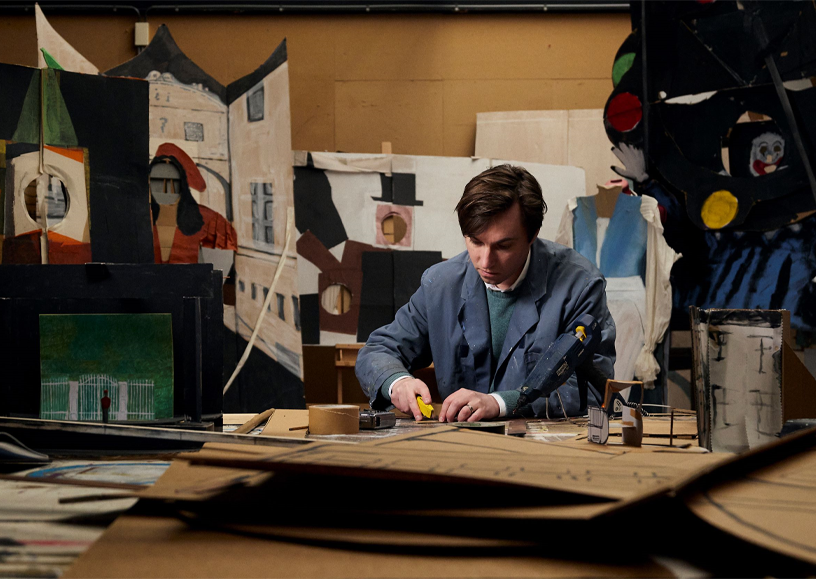
Grandiose and enthralling
The theatre company Steef de Jong founded with Ina Veen is called Groots en Meeslepend (Grandiose and Enthralling) for a good reason: those words encapsulate what he thinks theatre should be. “I want it to be something you experience intensely, where you become so engrossed in the story that you find yourself audibly sighing or catching your breath. The cardboard decors are all part of that: every time one is unfolded, there is a new surprise.”
Steef believes the handmade costumes and cardboard decors, that are so typical of his productions, epitomise the force of the imagination. “I want people in the audience, whether children or adults, to think, ‘Wow, I’m going to make a castle from a cardboard box too.’ Because you only need very simple things to create your own fantasy world. I see that as a counterforce to all the misery in the world. When so much is being destroyed, let’s make something instead. It really doesn’t have to be exquisite or perfect. In the end, what matters is that you can briefly escape from reality into your self-created world — whether on the stage or elsewhere.” The same applies to Operetta Land: “A performance should be a joyful night out, an antidote to all the cynicism and gloom.”
Family production
Although Operetta Land is a family production, Steef did not create it specifically with children in mind. “The things I make often have a sense of childlike wonder, but I never deliberately create something for children, or for adults. It’s more a question of assuming that children will be in the audience too. Anyway, I don’t think children need to be exclusively served cultural products made especially for them. The cultural experiences from my childhood that made a lasting impression on me were the times when I saw something that was not designed specifically for me but that I was also allowed to see. You don’t go with your parents to a museum to see paintings made especially for children. They’re just paintings.” What is more, Steef believes children have a different kind of wisdom, making them much more open and receptive than adults. “I think if you say, ‘This is now going to become a palace’, children are more likely to accept it.”
Dream for the future
When asked what his big dream for the future is, Steef replies without hesitation, “That’s a tricky one because this was my dream. To be able to create something like this for a stage of this calibre, with people of this calibre and with so many opportunities. I’m already living my dream so much so that I’ll have to think hard to come up with my next dream. Or perhaps I’ll just start a shop!”
Text: Ewout Ganzevoort
English translation: Clare Wilkinson
Paulien Cornelisse on the texts for Operetta Land
She is well known in the Netherlands for her books and columns on language, her novel De verwarde cavia (The Confused Guinea Pig), her comedy shows and her television appearances. Operetta Land was her first libretto. “I hadn’t realised how much the operetta music would stick in my head.”
‘Prosaic and absurd’
Paulien Cornelisse on the texts for Operetta Land
Steef approached you to write the texts for Operetta Land. Why did you decide to accept?
Steef phoned me to tell me he had been asked to create an operetta, a family production for Dutch National Opera. He had a story in mind but he didn’t want to write the actual libretto. I have experience in writing dialogues, so I was interested in doing it. But... I didn’t have the time as I’m currently on tour with my latest show. However, at some point I did meet up with Steef and I became so inspired by his story that by the end of our conversation I’d decided I would simply make time. And that’s what happened.
You are famous for your way with words and you wrote a novel about a guinea pig who works in an office — a pretty absurd situation. How is that background reflected in the texts for Operetta Land?
I wrote the spoken texts between the songs in everyday language. For example, Princess Galathea says “Seriously, Mum?” to the queen. That’s something I hear all the time in daily life. I like the idea of a recognisable dialogue that you might hear in your own life, even if in Operetta Land it’s about hedge-clipping hussars going on strike. In my opinion, the prosaic and the absurd are a perfect match.
I also like writing about people who are forced to rub along together. In my book about the guinea pig, that was an office setting. Operetta Land takes place at a royal court, but that is basically also a kind of office with plenty of scope for misunderstandings and issues such as ‘Who is the boss here?’ and ‘What do the authorities want from me?’
What experience do you have with opera and operetta?
It feels a bit sacrilegious to say so now, but I’m really more of an opera person. I’ve seen far more operas than I have operettas. But of course I’m also a comedian, which means I find it important to make people laugh. So in that sense I feel I am a good fit with the world of operetta.
My main specific experience of operetta was Marco Bakker singing ‘Zwei Herzen im Dreivierteltakt’ in the Dutch comedy film Theo en Thea en de ontmaskering van het tenenkaasimperium. Quite unforgettable of course, but I only started to recognise the poetry in operetta when I saw Steef’s previous shows.
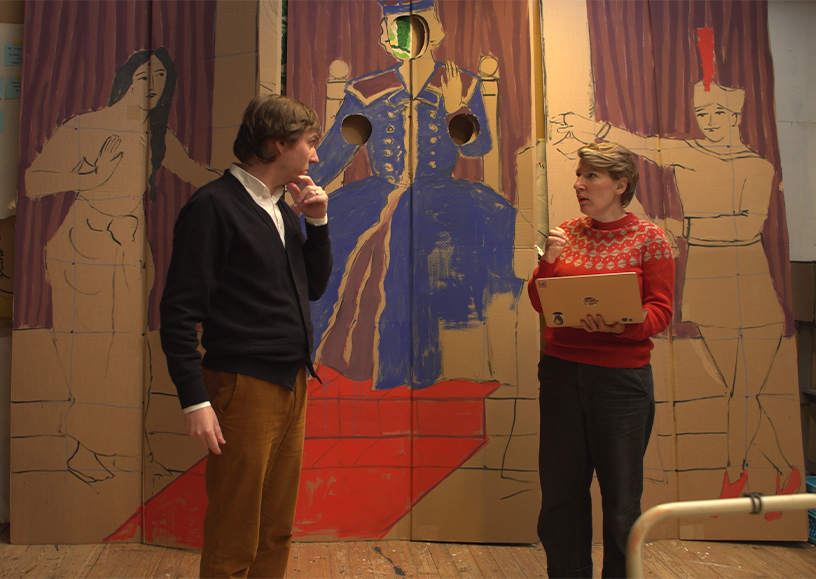
You also wrote the texts for the songs. How did you do that and what were the challenges?
It was difficult, but really fun to do. The Gilbert and Sullivan texts in particular are sung very fast; you need to pay attention to where the sustained notes are and make sure they are in a logical place in the Dutch too. What I hadn’t realised was how much the operetta music would stick in my head. At one point, I had to stop working on Operetta Land after dinner because I knew that otherwise the music would be going round in my brain all night. That is the dark side of operetta.
Operetta Land is a family production. How do you write a text that appeals to both children and adults?
Well, I hope I’ve managed that. On the one hand, I wrote with myself in mind and on the other I kept thinking about what my son would like — he’s nearly eight. Anyway, I believe eight-year-olds can already appreciate irony while seventy-year-olds can still have a good laugh at a poo joke
What is it like working with Steef?
Our collaboration went really smoothly. I got the impression we each gained from the other. For example, Steef had this idea of introducing an angry king and I said, “How about if he comes from an opera land rather than Operetta Land?” That idea took on a life of its own. King Pygmalion sings opera music that no one understands, and he brings with him a risk that there won’t be a happy end in Operetta Land. Whereas Steef says that is rule number one in operettas: there is always a happy ending.
It was also interesting embroidering on some of Steef’s ideas. For example, one of the characters is called Lady Kant — and I smuggled some things into her dialogue that refer to the philosophy of Immanuel Kant. It’s quite possible no one will notice, but I wrote it in such a way that you can still enjoy listening without that extra nuance.
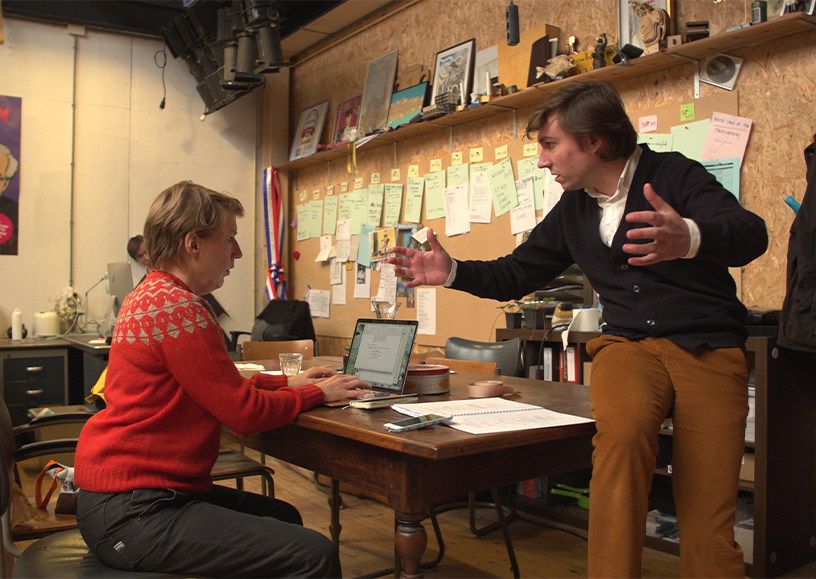
What was your favourite scene to write?
I really enjoyed writing the scene in which Galathea and King Pygmalion flirt. King Pygmalion is a creep but Galathea doesn’t realise that. At one point she has to go to the toilet and creepy Pygmalion says, “I wish I could come with you”. To which Galathea says, “Well, I need to poo and put a fresh tampon in.” I personally really liked being able to give a tampon a role on the stage of Dutch National Opera & Ballet. I find it refreshing anyway when princesses tell it like it is. I also enjoyed giving Steef a kissing scene. Usually, he’s up there on the stage on his own, but this time there is a good-looking prince too, so I thought there should be a kiss.
Which character stole your heart and why?
Oh no... do I have to choose? I really like Count Lothar, the Queen’s sensitive councillor in Operetta Land. I have a soft spot for him because he is very weepy and panics easily. Another of my favourites is Count Lothar’s bird Sir Taki, who is magicked into a human. Sir Taki can wryly observe all the goings on from a distance precisely because he isn’t a real human being. I can understand why he eventually wants to go back to being a bird.
What do you hope people get out of this production?
I hope they go home and immediately start singing or writing or crafting something. I hope it stimulates their creativity. And of course I also hope people who might be going through difficult times feel a little bit better. Operetta Land is a feel-good production. Steef once said to me, “I believe there’s as much nuance and depth in happiness as in sadness.” I like that thought, and that’s why the final song contains the line “light, air and joy have eternal qualities too”. That is a nice message for people to take home with them.
Text: Laura Roling and Paulien Cornelisse
English Translation: Clare Wilkinson
Interview with the conductor Aldert Vermeulen
Aldert Vermeulen is the conductor for Operetta Land, leading the young musicians of the National Youth Orchestra of the Netherlands. He talks to us about precision, finesse and the various operetta traditions reflected in this production.
‘Floating in unison — that is the aim’
Interview with the conductor Aldert Vermeulen
How much experience do you have with operetta?
Quite a bit, actually. Over the years, I have done three productions of The Merry Widow by Franz Lehár, one of the classic operettas in my opinion. I’ve also conducted numerous New Year concerts around the world, from Hong Kong to Groningen, and operetta is a standard element in that repertoire.
Is conducting operetta difficult?
It might sound surprising but in fact operetta is one of the most difficult things to conduct. The music is so fluid and clear-cut that you hear immediately if something is not as it should be. In that sense it is similar to conducting Mozart: you need to be very precise, even when you are taking liberties. Take the frequent use of rubato, which allows you to be freer in your phrasing. But even then, you still need to have everyone in the orchestra to be precisely in sync, because otherwise it sounds a mess. The effect you want to achieve is of floating in unison in the waltzes, barely touching the ground. Of course, you can also play a waltz in an oom-pah-pah style, but the lovely thing about operetta is that there is so much finesse and sophistication in the various waltzes. As a conductor, you need to bring that out.
What is it like working with the National Youth Orchestra?
Fantastic! The members are sprightly young musicians, very eager, who all want to get everything precisely right. All the individual players have reached a very high standard as instrumentalists and they really want to find the right sound as a group. Their energy also means we have an awful lot of fun.
Many of the song texts were rewritten in Dutch for Operetta Land. What are the challenges of singing in Dutch?
I think the biggest challenge is that it’s so rare for classical music to be sung in Dutch. Singers are no longer practised in that. Before the war, operas were often rewritten and performed in Dutch, but that tradition has been lost completely. There are standard techniques for singing diphthongs and consonants in German, for example, but there aren’t really equivalents for Dutch. That’s why we use the German approach with a few modifications: the singer needs to vocalise the Dutch diphthong ‘ij’ differently to a German ‘ei’.
It really helps that the Dutch texts are rock solid. In terms of the sound, they fit the music perfectly, and they feel very natural. When I hear Elenora sing “This is my heart”, I quite forget it is actually a rewrite of a German song; it sounds as if it was written originally in Dutch.
Marijn van Prooijen was responsible for the arrangements for Operetta Land. What exactly did he do?
A lot of what we play is the original music, in the orchestration by the composers themselves. That is the case for perhaps eighty to ninety per cent. But we have the same setup in the orchestra for the whole performance, so Marijn has changed the mix of instruments in places to make it more aligned. He also composed music based on existing selections for the transitions. That music is used for scene changes or for the melodrama, which is when the characters are talking over the music. In that case, it is important for the music to reflect the intention in the spoken text.
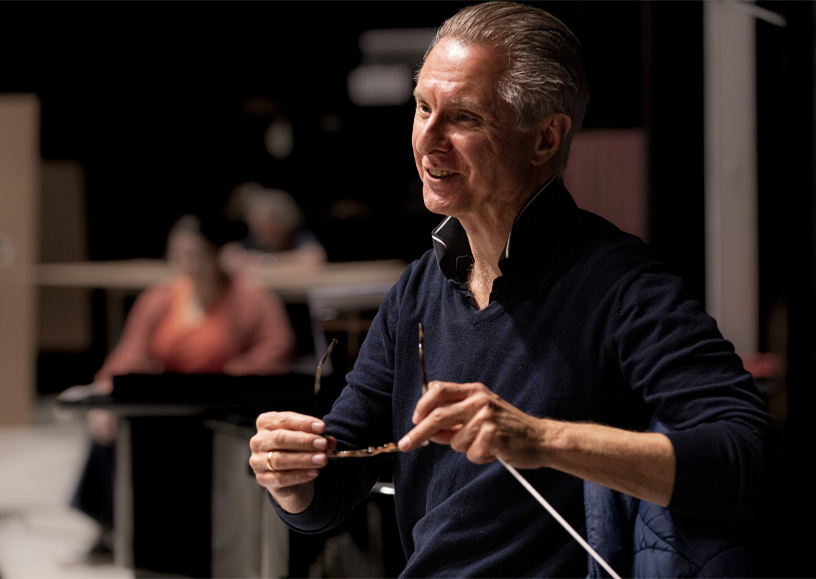
Operetta used to be a popular genre in the Netherlands, especially in amateur circles. There were active operetta societies all over the country — until about twenty years ago. Have you any idea what happened?
I think there came a point when the staging choices and ideas about operetta productions no longer appealed to the new generation. The approach to operetta was stuck in a certain tradition from the immediate post-war period. People were faithful to that tradition for a long time, which meant that operetta inevitably became something old-fashioned and nostalgic. But of course that doesn’t have to be the case.
Operetta Land is not a collection of greatest hits from the operetta repertoire.
Absolutely not. ‘Dunkelrote Rosen’ is the only real evergreen. Steef has mainly selected relatively unknown pieces from a wide range of traditions and countries. The music of Gilbert and Sullivan has always been very popular in Britain but never really took off on the continent. We also have music from the operettas of Offenbach. That music is rooted in the French tradition, where the text and its declamation were important, and the melodies were composed around that. The Viennese operettas are much richer harmonically. I like to compare the French and Viennese repertoires by saying that French operettas have a very strong skeleton whereas Viennese operettas have much more meat on the bones.
What do you think Operetta Land can do for operetta?
Of course we use a lot of operetta music in Operetta Land, but I don’t really see the production as a new operetta. It is more of an operetta about operettas, with a great deal of humour. What I hope is that it will make people curious to learn more about the genre. Operetta has a reputation for being light and airy, but there is depth and nuance to that lightness. In Viennese operetta, for instance, there is a strong undercurrent of melancholy under the upbeat surface, and that’s the beauty of the genre for me.
Originally, operettas were also quite critical of society. Take the operettas from the dying days of the Habsburg Empire, which often poked fun at the cumbersome, bureaucratic government apparatus. Those operettas are full of civil servants who basically do nothing all day. We can relate to something like that today too, so in that regard, the humour in operetta is timeless. Operetta is not vulgar or superficial and the humour certainly doesn’t have to be dated. My main hope therefore, is that Operetta Land makes people hungry for more.
Text: Laura Roling
English translation: Clare Wilkinson
Operetta: a brief history
Are the glory days of operetta over for good? The grant for Hoofdstad Operette, The Netherlands’ only remaining professional operetta company, was terminated in 2000. And what was once a flourishing amateur circuit has become a shadow of its former self: whereas more than a hundred operetta societies used to be found throughout The Netherlands, only a few are still operating today. Even the operetta society Thalia in Amsterdam, where star soprano Cristina Deutekom started her career, closed in 2022. We present a brief history of the rise and (temporary?) fall of operetta.
Operetta: a brief history
After opera emerged in Italy in the second half of the sixteenth century, more light-hearted forms of musical theatre soon followed, such as opera buffa in Italy and Singspiel in Germany. As ‘lighter’ versions of opera, they can be seen as precursors of operetta, even if operetta only really crystallised as an art form when the French composer Jacques Offenbach founded his Théâtre des Bouffes-Parisiens in 1855. He would compose more than one hundred operettas in the course of his life, including evergreens such as Orphée aux enfers (Orpheus in the Underworld, 1858), La belle Hélène (1864), La vie Parisienne (1866), La Périchole (1868) and Les brigands (1869). His works were a great success in the Paris of the Second Empire. It was a time when the urban middle classes had money to spend, dreamt of yet more wealth (and status!) and enjoyed provoking the establishment and defying the moral standards of the day. Offenbach’s body of work played into this with works filled with parodic and satirical elements, using humour to criticise society. His operettas poked fun at the bourgeoisie, to the tune of flowing, cheerful melodies.
Vienna
This new art form spread from Paris to Vienna, with Vienna soon developing into the second epicentre of operetta. The first production to originate in Vienna premiered in 1860. This was Das Pensionat by Franz von Suppé, a work that is clearly influenced by Offenbach. Viennese operetta only acquired its own distinctive character when Johann Strauss II, the king of the waltz, started composing for the genre. His Die Fledermaus (1874) is one of the most popular operettas of all time. A Golden Age commenced for Viennese operetta, with relatively muted social criticism and plenty of room for the ‘romance of the waltz’.
When the operetta greats of Franz von Suppé, Carl Zeller and Johann Strauss II were followed into their graves by Karl Millöcker (who died on 31 December 1899), Viennese operetta was ‘declared dead’. But not for long. In 1905, the premiere of Franz Lehár’s Die lustige Witwe (The Merry Widow) marked the start of a second heyday. Key composers, in addition to Lehár, during this so-called “Silver Age” of Viennese operetta were Oscar Straus, Leo Fall and Emmerich Kálmán. Rather than wallowing in nostalgia, their operettas embraced modernity. Trains, restaurants and cinemas all make their appearance in these works, but there was also room for reflections on the capitalist system. An example of this can be seen in Leo Fall’s Die Dollarprinzessin, an operetta about the romance between an impoverished European aristocrat and the daughter of an American millionaire.
The glory days of the Viennese operetta came to an end in the 1930s. Many composers were Jewish and became victims of the Nazi regime or fled to America. There, they continued their creative activities in a new environment with very different artistic impulses, which frequently led them in the direction of the musical.
Berlin
In 1899, when the Golden Age of Viennese operetta seemed to be over, Berlin took over the baton with the premiere of Paul Lincke’s Frau Luna. In these Berlin operettas, the march took precedence over the waltz. Like their Viennese counterparts, the Berlin operettas, by composers such as Paul Abraham and Walter Kollo, were firmly rooted in the society in which they originated: they reflected upon life in the city and were written in Berlin dialect. Another typical feature of Berlin operetta was the revue format, with a strong focus on variety show elements.
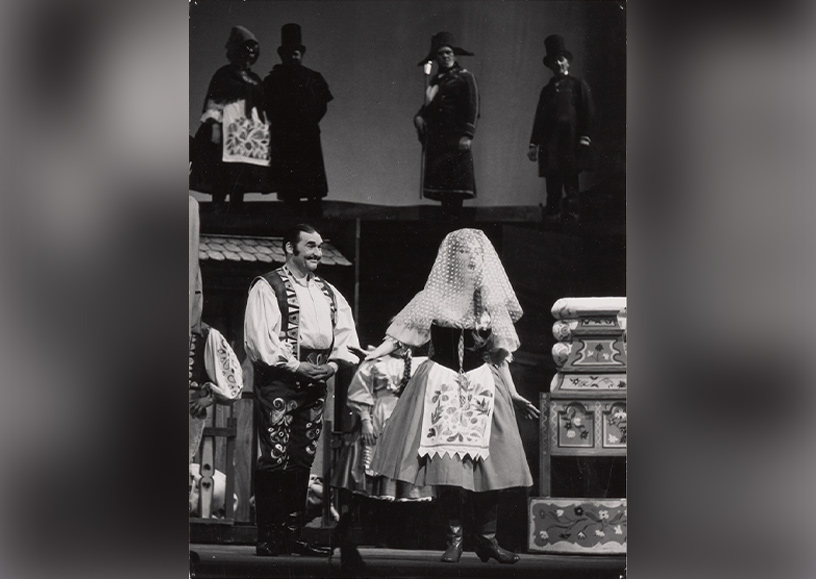
Great Britain
Two names are inextricably linked with operetta in Great Britain: those of the librettist William S. Gilbert (1836-1911) and the composer Arthur Sullivan (1842-1900). Gilbert and Sullivan were initially heavily influenced by the operettas that came from Offenbach’s Paris, but they soon developed their own distinctive and quintessentially British style. A key element was a typically British sense of humour. The operettas were also full of references to topical events and situations in Britain, which were probably lost on audiences outside Britain. For this reason, with the exception of The Mikado (1885), Gilbert and Sullivan’s operettas found little lasting success on the continent.
The Netherlands
Enthusiasm for the operettas of Offenbach could also be found among Dutch audiences. In 1862, Orphée aux enfers was performed in Amsterdam by a German company and that same year, Offenbach’s own company visited Amsterdam on tour with various one-act performances. Viennese operettas could also rely on a warm welcome in The Netherlands in the years that followed. Numerous local operetta companies were formed as a result. But of the forty to fifty operetta groups that came into existence between those early days and the Second World War, most only lasted a few seasons.
One company that kept going for more than a decade was De Haghezangers, which was founded in 1918. In the company’s thirteen years, it performed some seventy or eighty operettas, mainly on stages in The Hague and Amsterdam. About a quarter of these operettas were from France, with ‘Viennese’ and ‘German’ operettas dominating the repertoire. The company folded in 1931 when the director Louis Bouwmeester Jr passed away.
That gap was soon filled again with the establishment of the operetta ensemble De Operettezangers. This company put on its first performance on 30 July 1932, with The Vagabond King by the composer Rudolf Friml. In the years that followed, the repertoire included works such as Die Blume von Hawaii and Viktoria und ihr Husar, both by the German composer Paul Abraham, Im weissen Rössl by Ralph Benatzky, Madame de Pompadour by Leo Fall and De koningin van Montmartre, a Dutch operetta by the composer Vada Ennem (the professional name and anagram of Davy van Dam) and librettist Denn Spranklin (the professional name of Bram d’Oliveira).
Fritz Hirsch Operette
In 1925, Gustav Charlé, the director of the Neues Theater am Zoo in Berlin, came to the Netherlands with his ensemble for a Gastspiel. His performers included Fritz Hirsch, who received warm praise in the reviews. One year later, Fritz Hirsch returned to the Netherlands with his own operetta company, and stayed. “Let’s be honest,” wrote the Dutch Haagsche Courant newspaper, “no Dutch company is capable of equalling Fritz Hirsch and his group.” That marked the start of the Fritz Hirsch Operette. In the years that followed, this company would perform some seventy operettas.
Unlike other Dutch operetta companies, this ensemble performed all its operettas in German. It even had Richard Tauber, one of the greatest operetta tenors of all time, as a guest performer. Another star who sang with the Fritz Hirsch Operette company was Johan Heesters, a Dutch tenor who had a successful career that begun in Vienna and continued in Nazi Germany.
The Fritz Hirsch Operette performed its last operetta — Die Faschingsfee by Emmerich Kálmán — in 1940. It was unable to complete its tour because of the German invasion of The Netherlands. Later that year, on 1 October 1940, a company by the name of De Haagsche Operette was founded. This new ensemble was willing to take on the non-Jewish employees of the Fritz Hirsch Operette, although the only role available for Hirsch himself was as an advisor behind the scenes. He did not hold that position for long: in 1942, Fritz Hirsch died in the Mauthausen concentration camp.
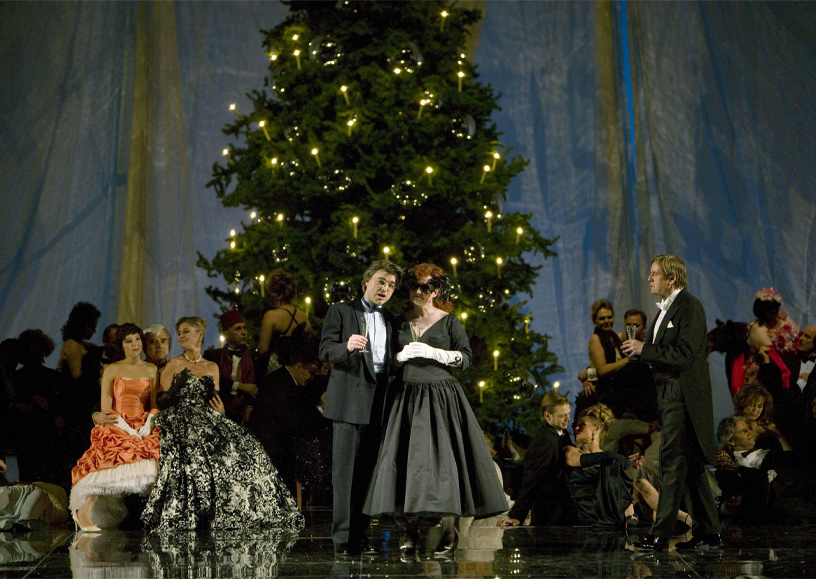
Operetta during the German occupation
When the Germans occupied The Netherlands in May 1940, operettas – even those by Jewish composers – initially continued to be performed as before. In November 1940, De Operettezangers still had Paul Abraham’s Viktoria und ihr Husar on its programme. Things would soon change, however, as life became increasingly difficult for Jewish performers and the world of operetta gradually became segregated. The newly founded Jewish company Joodsche Operette Studio was only allowed to perform the operettas of Kálmán and other Jewish composers in front of Jewish audiences. But eventually that too came to an end.
De Operettezangers continued to perform throughout the war years, and the occupying Germans also set up their own operetta companies. The Deutsches Theater in den Niederlanden was a company that performed opera, operetta and theatre in The Netherlands between 1942 and 1944. It put on operettas including Der Zigeunerbaron by Strauss and Das Land des Lächelns and Der Graf von Luxemburg by Lehár. In 1943, the Rheinisches Landestheater Arnheim was founded. These German companies did not survive the end of the war.
Flourishing professional operetta
It is striking how much enthusiasm there was for operetta immediately after the war, in the 1945-46 theatre season. De Operettezangers continued to put on performances until 1949, but new companies were founded as well: De Nederlandse Operette Studio (a continuation of De Joodsche Operette Studio by its surviving members), De Nationale Operette and Hoofdstad Operette. Most of these companies did not last long. The exception was Hoofdstad Operette, which grew to become the largest professional operetta company in The Netherlands and the only one to receive government funding.
For many years, the company’s posters described it as “the successor to the former Fritz Hirsch Operette”. In the first five years of its existence, all its operettas were performed in Dutch. The company’s first production in 1945 was Driemeisjeshuis (originally Das Dreimäderlhaus, a pastiche operetta with music by Franz Schubert); the German language was a sensitive subject so soon after the war. It was not until 1950 that the company was prepared to perform Paul Abraham’s Viktoria und ihr Husar in its original German language. “Viennese German, not that hard Prussian German,” noted director Meyer Hamel in an interview.
From the 1970s, Hoofdstad Operette received government grants, although these could never be considered a given. In 1987, funding was almost terminated. Loud protests and the intervention of the Arts Council prevented this, but the discussion remained. The grant was finally terminated in 2000: it was deemed that the organisation had failed to rejuvenate the art form sufficiently. Operetta in The Netherlands was now left in the hands of the opera companies – who rarely staged operettas – and amateurs.
Amateur companies
At its peak, The Netherlands had more than a hundred local amateur operetta societies. Many of these societies were founded in the crisis years following the Wall Street Crash of 1929. It was a period when people needed the gaiety, diversion and sense of community that operetta could offer. Similarly, for a number of years following the Second World War, operetta societies served the purpose of bringing people together.
We can only speculate as to why interest for operetta eventually faded. Did the art form fail to move with the times? Did the musical replace it in popular culture? Has operetta been caught up in a vicious circle of becoming increasingly unknown and therefore unloved? Whatever the reason, the numbers speak for themselves: of the hundred or so amateur societies once active in The Netherlands, only a handful remain today. Dutch National Opera sees Operetta Land as an opportunity to breathe new life into this genre. Rather than staging a major existing work such as Die Fledermaus or Die lustige Witwe, Dutch National Opera is bringing a new pastiche operetta that showcases a wide range of operetta traditions infused with a contemporary sense of humour. Steef de Jong has made it his mission to revive interest in operetta and hopes that many operettas – both existing and newly written – will follow.
Text: Laura Roling
English translation: Clare Wilkinson
SOURCES
- Bredschneyder, Fred. Elseviers groot operette- en musicalboek. Elsevier, 1972.
- Bredschneyder, Fred. Meer dan een eeuw operette in Nederland. Strengholt, 1995.
- Belima, A. & Derek B. Scott. The Cambridge Companion to Operetta. Cambridge University Press, 2020.
- Grun, Bernard. Die leichte Muse: Kulturgeschichte der Operette. Langen Müller Verlag, 1961.
- Trauber, Richard. Operetta: A Theatrical History. Routledge, 2003.
Introducing...
Steef de Jong is accompanied on stage by an enthusiastic cast of singers. Here, they introduce themselves and their characters.
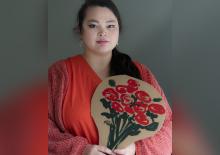
Soprano
Princess Galathea
Elenora Hu
How would you describe Operetta Land as a place — in three words?
Magic, music and joy.
How would you describe your character?
Galathea is an outstanding princess with a really tough attitude. She is loved by her adoptive mother and the people, but don’t talk to her about marriage. Love is a sensitive topic for her.
What do you like most about this production?
The decor, the texts and the interaction between all the singers and actors. Nothing is what it seems...
What do you think of operetta?
While operettas are often set in a very different time and place to our world, the people wrestle with the same everyday problems and feelings that we do. Frustrations about money, feeling insecure or lonely because you are different — and wanting a party so you can escape from it all. Operetta puts all this under a magnifying glass to show us the humorous side, while enjoying some wonderful music at the same time.
Why do you think fantasy and imagination are so important today?
These days, the internet makes it so easy to lose yourself within other people’s ideas and fantasy. Sometimes this is forced down our throats to such an extent that there is almost no room left for our own fantasy, while our power of imagination is actually the main instrument we have for coming up with new ideas and visions! Our imagination lets us picture the world not as it is but as we want it to be, while also giving us the means to make this dream come true.
What does your ideal fantasy world look like?
I don’t have an ideal fantasy world, but a nice garden full of plants, flowers, trees and animals, and humming with music of course, would suit me just fine.
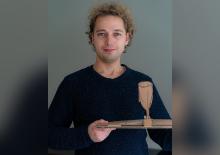
Baritone
Queen
Raoul Steffani
How would you describe Operetta Land as a place — in three words?
Fantasy, joy and champagne!
How would you describe your character?
I sing the role of the Queen of Operetta Land. She is crazy about champagne. Her biggest worry is finding a rich prince for her adopted daughter, Princess Galathea. That would fill the royal coffers and give her enough money to pay her army of hedge-clipping hussars so they can trim the whole country into tip-top shape.
What do you like most about this production?
The wonderful waltzing music and the humour and witticisms in both the text and the decor. Plus the amazing costume, which makes me look like I just walked off a Netflix series.
What do you think of operetta?
I love operetta. I love the elegance and the humour in the music. I spent a year studying in Vienna specifically to learn more about it. I also like the mix of music and spoken dialogues, which are all in Dutch in this production.
Why do you think fantasy and imagination are so important today?
It’s a great way of escaping from reality for a moment and building up the courage to do things that you would otherwise find too scary.
What does your ideal fantasy world look like?
Operetta Land gets pretty close!
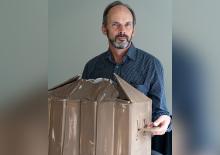
Bass- baritone
Minister of Finance
Marc Pantus
How would you describe Operetta Land as a place — in three words?
Champagne-coloured, sparkling and sweet.
How would you describe your character?
I only play a single character, but he is someone particularly troubled by mood swings. He is a ministerial fixture at the palace, he can read and write with Lady Kant, and can be in a huge panic one minute and cheerful and lively the next.
What do you like most about this production?
The nicest aspect of this production is the uninhibited inventiveness. And the lack of pretentiousness. Everything has been devised with great precision and then presented as if it’s off the cuff, like we’re going to pretend this was easy! I love it.
What do you think of operetta?
I rarely listen to music so I don’t listen to operetta, but my late mother would have been delighted to know I am now performing on the stage of the Dutch National Opera with a song by her beloved Robert Stolz. What’s more, I really enjoy the unashamed sentimentality and the wonderful escapism of operetta.
Why do you think fantasy and imagination are so important today?
Without fantasy and imagination, everything will always stay the same. There is a way out of the misery! Just try it.
What does your ideal fantasy world look like?
In my ideal fantasy world, all the food is delicious. It has the most beautiful paintings, the finest music, but it’s often wonderfully quiet… and none of your shoes pinch. There are other people too, but only quiet ones. You only hear them when they laugh, because they do have a sense of humour.
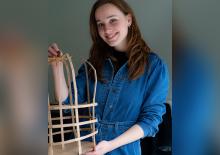
Soprano
Count Lothar
Laetitia Gerards
How would you describe Operetta Land as a place — in three words?
Magical, surprising and playful.
How would you describe your character?
Life is not easy for Count Lothar. He panics easily and is nervous. “Everything always works out well for everyone except me,” he says. He believes in love but is afraid of being made to look silly and being laughed at. After all, every operetta has a loser who gets the short end of the stick...
What do you like most about this production?
The creation of a fantasy world. During rehearsals, Steef had this wonderful way of including us in his fantasy so that we could all make a new world together. Everything comes together there: the singing, acting, amazing colleagues plus a wonderful orchestra. What more could you want?
What do you think of operetta?
I really enjoy the fantastic melodies that are common in operettas. Operetta is entertaining, but it often also contains some criticism of society, though it does so with a knowing wink, in a light-hearted, digestible manner.
Why do you think fantasy and imagination are so important today?
Fantasy lets us not only live in the real world but also create a world that does not yet exist. We badly need this in a time when we are facing so many challenges. It also helps us to escape briefly from the reality of these tough times.
What does your ideal fantasy world look like?
My ideal fantasy world is a world in which everyone is free and gets the opportunity to do what makes them happy. Where people sing and dance in the street and where you can eat as much chocolate as you want without getting sick.
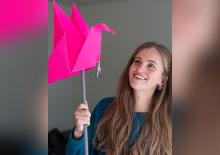
Mezzo- soprano
Sir Taki / Hedge-clipping Hussar
Femke Hulsman
How would you describe Operetta Land as a place — in three words?
Dancing, light and endearing.
How would you describe your character?
Sir Taki is Count Lothar’s bird. He is a bird that sees the future as bright: everything will be alright in the end. That’s just as well, as Count Lothar tends to forget that. Full of optimism, energy and the occasional hint of frustration, Sir Taki is constantly talking his friend out of despondency.
What do you like most about this production?
I’m really enjoying the opportunity to admire all these sweet, talented, creative colleagues from close quarters. I feel happy surrounded by the cardboard, the waltz music and these lovely people.
What do you think of operetta?
I’ve never performed in an operetta before but I think I’ll stay here in Operetta Land. What a joy this music is.
Why do you think fantasy and imagination are so important today?
Because fantasy and imagination produce the most wonderful worlds, which no one would ever discover otherwise.
What does your ideal fantasy world look like?
To be honest, performing in this production is a fantasy life for me. With the most amazing handmade costumes, metres-high decors, the moving story Steef has dreamt up, surrounded by the most incredibly talented singers, dancing on the stage of the Dutch National Opera... can this be real?
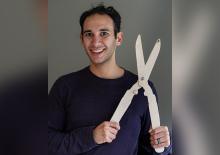
Tenor
Prince Nicola / Hedge-clipping Hussar
Ian Castro
How would you describe Operetta Land as a place — in three words?
Colourful, surprising and wild!
How would you describe your characters?
The Hedge-clipping Hussars are both fun-loving artists and soldiers, with a feel for the colourful world of landscape architecture. They make sure Operetta Land looks neat and tidy, while they also guard it against their vile neighbours from Operania.
Prince Nicola is the sweet surprise everyone is waiting for. He is warm-hearted and full of love. He may not come from Operetta Land, but deep down he knows this is the only place he could call home.
What do you like most about this production?
That we can create a place where everyone’s dreams can come true.
What do you think of operetta?
It is different to opera in a lovely, enjoyable way. We really have a lot of fun performing together on stage.
Why do you think fantasy and imagination are so important today?
We live in a time in which you can easily grow up too fast. We get so many stimuli that we forget to enjoy life. We also forget that we have the power to dream and to improve our lives.
What does your ideal fantasy world look like?
My dream world is one of journeys and discoveries! I go in search of treasure and have fun with my friends. It is a world full of exotic animals and brightly coloured plants. I’d like to investigate what this world has to offer us, and get some amazing memories along the way.
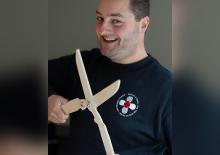
Bass- baritone
King Pygmalion / Hedge-clipping Hussar
Frederik Bergman
How would you describe Operetta Land as a place — in three words?
Joyful, eternal and hysterical.
How would you describe your character?
Pygmalion is a true opera baddie, full of melancholy and with evil plans. But the fun thing is he doesn’t see it that way at all. He feels completely at home in the ‘concrete-look’ Operania filled with dramatic emotions. Me too, actually...
What do you like most about this production?
It’s wonderful to go around misleading everyone with my clever plan. Of course you can only be a downright baddie like this on stage, not in real life. In addition, I’m doing this production with an incredibly nice group of people.
What do you think of operetta?
Operetta is relatively new for me. It’s really fun to explore the possibilities and liberties that you don’t normally get in opera. It took me a while to get used to the music, but once you have embraced it you can’t get it out of your head.
Why do you think fantasy and imagination are so important today?
Fantasy and imagination are always important. Without them, everything stays as it is and that is often the precursor to a downward spiral. Creativity stops you becoming complacent about what you have. It lets you assess whether you could make some improvements.
What does your ideal fantasy world look like?
In my fantasy world, there are no more taboos and everything can be discussed. On top of that, everything you do there should be enjoyable. That is what matters, rather than whether it makes commercial sense. Some enjoyable things just happen to cost money.
Programmaboek
Become a Friend of Dutch National opera
Friends of Dutch National Opera support the singers and creators of our company. That friendship is indispensable to them and we are happy to do something in return. For Opera Friends, we organise exclusive activities behind the scenes and online. You will receive our Friends magazine, have priority in ticket sales and a 10% discount in the Dutch National Opera & Ballet shop.





